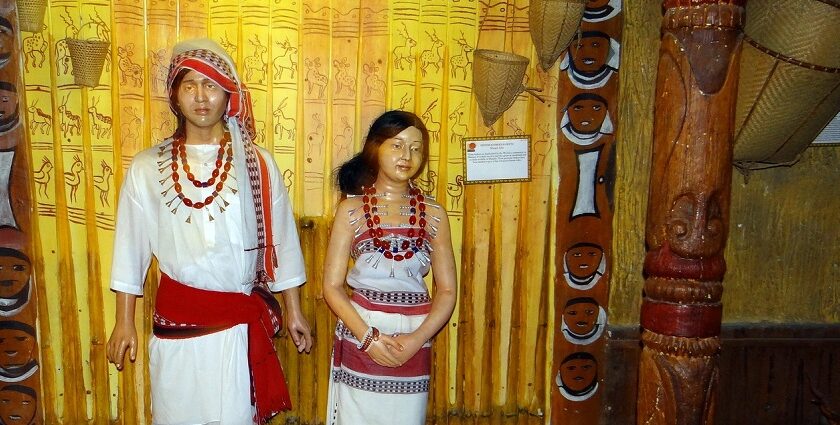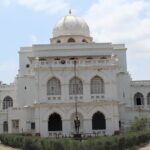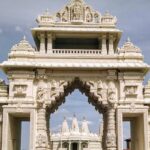The harvest festival of Manipur is an enriched illustration of the rich agrarian heritage of this northeastern Indian state. These festivals take place throughout the year among the communities, showcasing their diverse tradition—be it the Lai Haraoba of the Meiteis or Chavang Kut of Kuki-Chin-Mizos. These celebrations bring detail to the cultural identity distinct to Manipur. Each festival is the epitome of agricultural traditions, spiritual beliefs, and the bond among the community members of the state, which gives visitors an indelible experience of the culture of Manipur.
Location
Photo: ch_15march / Wikimedia Commons
Manipur, known as the “Jewel of India,” is nestled in the northeastern part of the country, bordering Myanmar. The harvest festival in Manipur is celebrated across the state’s varied landscapes, from the Imphal Valley’s lush paddy fields to the surrounding hills’ terraced slopes. While each region has its specific celebrations, the capital city of Imphal often hosts grand, inclusive festivities that showcase the state’s cultural diversity.
How To Reach
Photo: Haoreima / Wikimedia Commons
By Air: The most convenient way to reach Manipur is by flying to Bir Tikendrajit International Airport in Imphal, which is connected to major cities like Delhi, Kolkata, and Guwahati.
By Rail: The nearest railway station is Dimapur in Nagaland, about 215 km from Imphal. From there, you can take a taxi or bus to Imphal.
By Road: Manipur is accessible by road from neighbouring states. Buses and shared taxis operate from Guwahati and other nearby cities, offering scenic journeys through the Northeast.
Places To Visit After Harvest Festival Of Manipur
1. Imphal
Photo: PP Yoonus / Wikimedia Commons
Imphal, the capital city of Manipur, serves as the epicentre for many harvest festival celebrations. During these festivals, the city comes alive with vibrant displays of traditional dances, music performances, and ancient rituals. The Khuman Lampak Sports Complex and Hapta Kangjeibung often host large-scale events, showcasing the diverse traditions of Manipur’s various communities. Visitors can experience a comprehensive display of Manipuri culture, from the graceful Ras Lila dance to the lively Thang-Ta martial arts. Imphal’s festivals offer a unique opportunity to witness the harmonious blend of various cultural elements in one location.
Timings: Various, depending on the specific festival
2. Moirang
Photo: Haoreima / Wikimedia Commons
Moirang, located about 45 km from Imphal, is renowned for its celebration of the Lai Haraoba festival. This ancient pre-Hindu Meitei festival, typically held in April or May, transforms the town into a hub of cultural activities. The Moirang Khunou area, with its historical significance, becomes the focal point of the celebrations. Visitors can witness the elaborate rituals, traditional dances, and the reenactment of the creation myth. The festival provides a unique insight into the indigenous beliefs and practices of the Meitei people, offering a glimpse into Manipur’s rich cultural heritage.
Timings: Lai Haraoba is usually celebrated in April or May
3. Ukhrul
Photo: Ac apam / Wikimedia Commons / Image For Representation Only
Ukhrul, the homeland of the Tangkhul Naga tribe, is known for its vibrant celebration of the Luira festival in Manipur. This spring festival, typically observed in February, marks the beginning of the seed-sowing season. The town comes alive with traditional music, dance performances, and community feasts. Visitors can experience the unique culture of the Tangkhul people through their colourful attire, Indigenous games, and age-old rituals. The Luira festival in Ukhrul offers a fascinating glimpse into the agricultural practices and spiritual beliefs of this Naga community.
Timings: Luira is usually celebrated in February
4. Churachandpur
Photo:Frank Schulenburg / Wikimedia Commons
Churachandpur, the second-largest town in Manipur, is a hub for the Kut festival celebrations. This celebration belongs to the Mizo-Kuki-Chin- communities in Manipur. This post-harvest festival, typically held in November, fills the town with joyous festivities. The Kut celebration grounds become a focal point for cultural displays, including traditional dances, music performances, and fashion shows showcasing tribal attire. Visitors can immerse themselves in the rich cultural heritage of these communities, enjoying local delicacies and witnessing unique customs. Churachandpur’s Kut celebrations offer a vibrant display of unity among various tribes.
Timings: Kut is typically celebrated on November 1st
5. Tamenglong
Photo: Mongyamba / Wikimedia Commons / Image For Representation Only
Tamenglong, home to the Rongmei Naga tribe, is known for its celebration of the Gan-Ngai festival. This post-harvest festival, usually held in December, transforms the town with colourful decorations and lively festivities. The community grounds become venues for traditional dance performances, folk music, and indigenous games. Visitors can experience unique Rongmei customs, witness the ritualistic offerings to deities, and enjoy the warm hospitality of the local people. Tamenglong’s Gan-Ngai celebrations offer a fascinating insight into the cultural practices and social structure of the Rongmei community.
Timings: Gan-Ngai is typically celebrated in late December
Where To Stay
Photo:Andrew Neel / Unsplash / Image For Representation Only
Accommodation in Manipur ranges from basic to comfortable, catering to various budgets. In Imphal, hotels like Classic Hotel and The Classic Grande offer good amenities for those seeking comfort. Mid-range options include government-run Manipur Tourism hotels in various districts. For a more authentic experience, many villages offer homestays, allowing visitors to immerse themselves in local culture. In Moirang, the Sendra Resort offers a unique experience with its location on Loktak Lake, while in Ukhrul, the Shirui Lily Resort provides comfortable accommodation with stunning views of the surrounding hills.
Where To Eat
Photo: Pille R. Priske / Unsplash / Image For Representation Only
The harvest festival of Manipur is as much a culinary delight as they are cultural experience. Each region offers unique local cuisines that are integral to their festival celebrations. In Imphal, restaurants like Luxmi Kitchen and The Ching Tam serve authentic Manipuri dishes. During festivals, community feasts are common, offering visitors a chance to taste traditional dishes like Eromba (a spicy vegetable dish), Nga-thong (fish curry), and Chamthong (vegetable stew). Street food stalls and temporary food markets set up during festivals are perfect for trying local specialities like Singju (a spicy salad) and Tamu (betel nut).
Best Time To Visit
Photo: Kajikho_Alex / Pixabay / Image For Representation Only
The best time to visit the harvest festival of Manipur depends on which festival you wish to experience. However, the period from October to April is generally considered ideal, encompassing most major harvest celebrations. During these months, the temperature ranges from 15°C to 30°C, which is relatively pleasant. It’s important to note that Manipur experiences heavy rainfall from May to September, which can affect travel plans.
Other Factors To Consider
Photo: Dariusz Sankowski / Unsplash / Image For Representation Only
Average Cost Of The Trip
Budget travellers can manage with about ₹1,000 – 2,000 per day, including basic accommodation, food, and local transport. Mid-range travellers might spend ₹2,500 – 4,000 daily, while those seeking more comfort could spend ₹5,000 or more. Festival times might see a slight increase in prices. It’s advisable to carry some extra cash as ATMs can be limited in rural areas.
Tips For Travellers
- Obtain the necessary permits to enter Manipur well in advance. While Indian citizens don’t need a permit, foreign nationals require a Protected Area Permit (PAP).
- Respect local customs and dress modestly, especially during religious ceremonies. Many festivals have specific dress codes or colour themes that visitors are encouraged to follow.
- Carry cash, as ATMs are limited in rural areas. Credit card acceptance is not widespread outside of major hotels in Imphal.
- Be prepared for basic amenities in more remote locations. While Imphal offers modern facilities, smaller towns and villages might have limited infrastructure.
- Learn a few phrases in Meiteilon (Manipuri) or the local dialect of the area you’re visiting. This gesture is often appreciated by the locals.
- Carry appropriate clothing for varying weather conditions. While days can be warm, evenings can get cool, especially in hilly areas.
- Be mindful of photography restrictions, especially during sacred rituals. Always ask for permission before taking photos of people or inside religious places.
- Try local cuisines, but be cautious with street food to avoid health issues. Stick to bottled water and well-cooked foods.
The harvest festival of Manipur, called Chavang Kut is the vibrant celebration of nature’s bounty and cultural heritage. From the graceful movements of the Ras Lila to the energetic beats of tribal drums, each festival tells a story of Manipur’s diverse communities and their deep connection to the land. To experience the charm of these festivals firsthand, plan a trip with TripXL to ensure an unforgettable experience.
Cover Photo: sarangibsarangib / Pixabay


 WhatsApp
WhatsApp
 Twitter
Twitter



